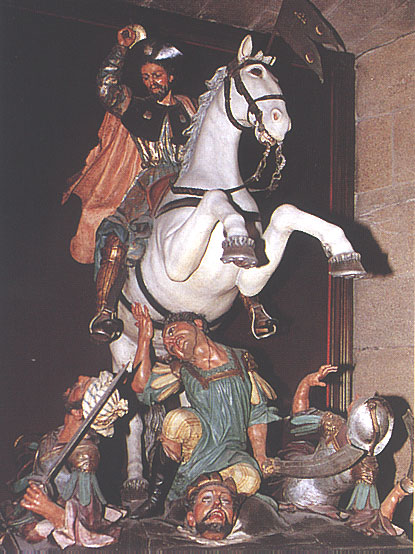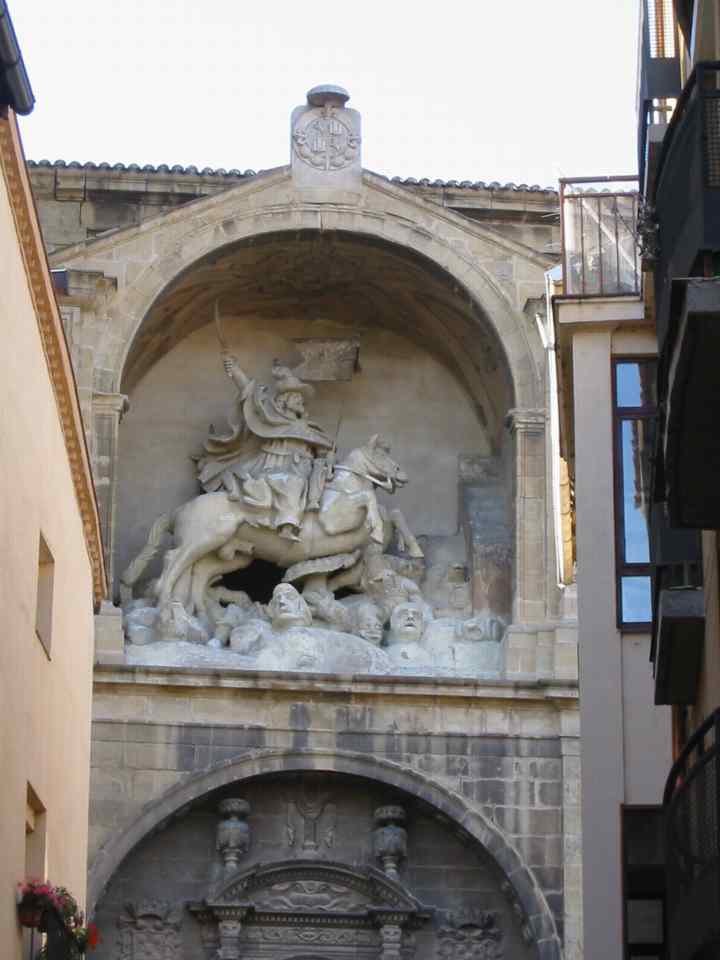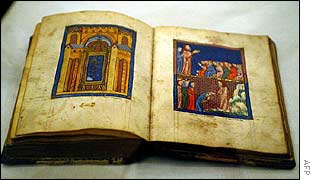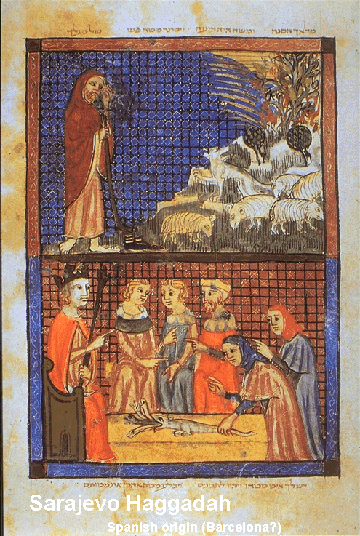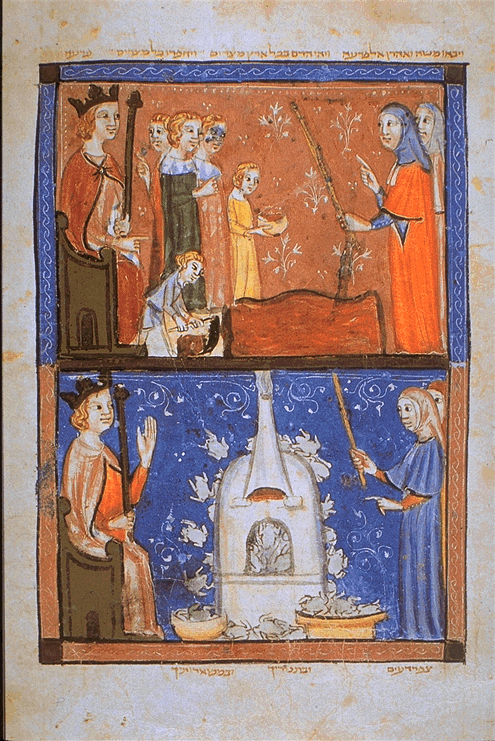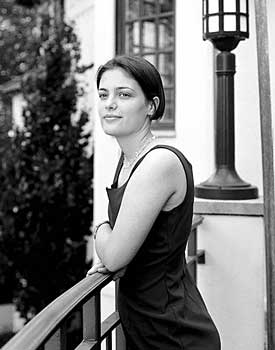|
An Indebted Israel Shelters a Kosova Family (NY Times)
http://www.alb-net.com/kcc/050399e.htm
By JOEL GREENBERG
MAAGAN MIKHAEL,
Israel
-- When Lamija Jaha and her husband were driven out of their apartment and
herded with thousands of ethnic Albanians to trains that would take them
from Pristina, the capital of Kosova, she took a memento of her dead father
in her pocket.
Trudging into exile on that first day of April, she had no idea that the
simple souvenir from her lost home -- a copy of a certificate bearing her
father's name -- would help pluck her family from the Balkan flames and
bring it to this kibbutz on the northern Israeli coast.
That piece of paper would take the Jaha family, in a way, full circle. It
was the copy of a certificate, issued by the Yad Vashem Holocaust memorial
in Jerusalem, commending her parents, Dervis and Servet Korkut, both
Muslims, for risking their lives to save Jews during World War II, and
honoring them as "righteous among the nations."
In World War II, Mrs. Jaha's parents lived in Nazi-controlled Sarajevo,
where she was later born and her mother remains today. Not only did the
Korkuts hide several Jews from the local pro-Nazi regime, but Dervis Korkut
saved the precious Sarajevo Haggadah, concealing it in his home and thus
keeping the 14th-century volume, the best known illuminated Hebrew
manuscript, intact.
Now it was Mrs. Jaha who was expelled from her Kosova home and herded onto a
crowded train in scenes that have evoked comparisons with the Holocaust.
After arriving in
Macedonia,
Mrs. Jaha showed her father's commendation to officials of the Jewish
community in the capital, Skopje.
They helped Mrs. Jaha and her husband, Vllaznim, to join a planeload of
Kosovar Albanian refugees accepted by Israel.
More than 50 years after her parents sheltered Jews in their home, she found
shelter in the Jewish state.
"I don't know how to express how much this means to me," Mrs. Jaha, 44, said
in an interview at a hostel in Maagan Mikhael, where the 115 refugees are
being housed. "My father did what he did with all his heart, not to get
anything in return. Fifty years later, it returns somehow. It's a kind of a
circle."
Mrs. Jaha's father was a museum curator and a prominent figure in Sarajevo,
an expert on the ethnic history of Bosnia-Herzegovina who knew several
languages and took a special interest in Jewish contributions to the
cultural mosaic of his country. In published articles, he wrote about the
culture and art of Bosnia's Jews, defending them against anti-Semitic
attacks and asserting that they were an integral part of Bosnian society.
As thousands of Jews were rounded up and shipped off to concentration camps,
Korkut took the deadly risk of hiding several in his home. Mira Bakovic, a
Jewish survivor who was traced by Yad Vashem, recalled that the Korkuts put
her up for half a year after she sneaked back to Sarajevo following a stint
as an anti-Nazi partisan fighter.
She was was presented to visitors as a housemaid with the Muslim name Amira
and served guests, including German officers, veiled according to Muslim
custom.
Mira Bakovic died last year at age 76, but her son, Davor Bakovic, 50, who
immigrated to Israel
from Yugoslavia in 1970 and lives near Jerusalem, greeted Mrs. Jaha when she
and her husband arrived at
Ben-Gurion
Airport on April 12.
"It was an amazing discovery," Bakovic recalled. "I felt as if a sister had
appeared from a faraway place. I felt close to these people even though I
didn't know them at all. The circle of my life had become linked with Lamija
and her family. To me it proved that people can't be divided up into nations
and sects. They're human beings who can touch each other."
The meeting was also a revelation for Mrs. Jaha. She said that her father,
who died when she was 14, never mentioned to her that he had sheltered Jews,
and that her mother told her briefly about it only a few years ago. "My
father didn't do it so he could tell us about it later," Mrs. Jaha said. But
in the end, "anything my father did brought me good."
For the Jahas,
Israel
is a new beginning after days of hell.
In the crush at the Pristina train station, they climbed through a window to
get into a packed passenger car. Two bags in which they had tucked mementos
of their life -- family photos, a picture of Korkut, his books, a daughter's
diary -- were lost in the chaos.
Dumped on the Macedonian border in darkness, the Jahas marched along the
tracks into a teeming no man's land where they spent 11 hours before gaining
entry with a small group of refugees at a Macedonian checkpoint.
After an unsuccessful attempt to get permission to go to Sweden, where her
brother-in-law lives, Mrs. Jaha went to the offices of the Jewish community
in Skopje and showed the certificate awarded to her parents. A few years
ago, her mother had been evacuated from Sarajevo in a convoy organized by
Jews there during the Bosnian war, and Mrs. Jaha hoped she might get similar
help. The president of the Jewish community in Skopje, Victor Mizrahi,
promised help.
Asked whether she was willing to go to Israel on a refugee flight organized
by the Jewish Agency, an organization that usually brings Jewish immigrants
to Israel, Mrs. Jaha readily agreed.
"I told them that it was no problem, and that we wanted to go somewhere
safe," she recalled, noting that she was unconcerned by the occasional
outbreaks of Arab-Israeli violence. "The problems here are nothing compared
to the situation in Kosova. You can find terrorism all over the world."
The Jahas' two children, Fitore, 20, and Fatos, 16, were smuggled out under
false Serbian identity to
Belgrade
and later to Budapest before their parents' expulsion.
They were brought to Israel on a separate Jewish Agency flight that carried
Serbian Jewish youngsters who had fled the NATO air attacks to
Hungary.
Reunited in Maagan Mikhael, living in white stucco guest rooms overlooking
the kibbutz's fish ponds and the
Mediterranean, the Jahas feel "like we're on vacation, not
refugees," Jaha said. The Jewish Agency has provided Hebrew classes and
lectures for the refugees, sightseeing trips, three meals a day and medical
care. There are also plans to start employing the newcomers at the kibbutz
and in neighboring industries.
Many of the refugees, who have been accepted by
Israel for six months,
say they would like to return to Kosova, but the Jahas say they have
resolved to settle in Israel.
Prime Minister Benjamin Netanyahu personally assured Mrs. Jaha that her
family can stay, and in recognition of her parents' deeds, the family is
eligible for Israeli citizenship.
"This was a big thing for us, because we have no home, we have nothing, and
we've come to a country that won't turn us back," said Mrs. Jaha.
"We have left our house for good. We wanted to go far away, where we and our
children could live without war."
Mrs. Jaha, an economist, and her husband, an electrical engineer, say they
plan to find work and permanent housing after learning Hebrew, and their
daughter, a college student, is determined to resume her computer studies at
an Israeli university.
"We're doing this for the children, not for us," Jaha said of the decision
to stay in Israel. "We lived one life. Now we're beginning another."
-----------------------------
What goes around, comes around
One family finds
freedom a generation after their ancestors defended it
By Cynthia Cannon
Princeton Packet Staff Writer
Wednesday, July 26, 2000
|
|
|

|
Neither fire nor wind,
birth nor death can erase our good deeds.
The profound words of the Buddha still ring true — many believe good
deeds never go unnoticed.
But sometimes it takes a while.
More than 50 years ago, in Nazi-controlled Sarajevo, Dervis and Servet
Korkut, both Muslims, risked their lives to save Jews during World War II.
But it wasn't until 1999 that the Korkuts' benevolence was returned. Last
April, a memento from World War II honoring the Korkuts for their good deed
saved the lives of their daughter, son-in-law and grandchildren.
Unfortunately, Mr. Korkut did not live to witness the gifts his family
reaped because of his kindness.
This is the story that both a cheerful and teary-eyed Fitore Jaha, the
Korkuts' granddaughter, shared with more than 85 guests at Thursday
evening's event, "From Kosovo to Israel — A Bridge to Peace." held at The
Center for Jewish Life in Princeton. The event was sponsored by the Young
Women's Group of the Princeton Chapter of Hadassah.
The 21-year-old Ms. Jaha was driven out of Kosovo, along with her family
and other Kosovar Albanian refugees, when their homeland was at war with the
Serbs in March 1999. Israel was the only country offering the refugees a
place to live.
Once in Israel, Hadassah played a key role in transforming the Jahas'
difficult life — particularly, Ms. Jaha's — into one of security and
opportunity.
Mr. Korkut, Ms. Jaha's maternal grandfather, was a museum curator and an
expert on the ethnic history of Bosnia-Herzegovina, she said, unfolding her
inspiring story. During the Holocaust, he published articles in which he
defended Bosnian Jews against anti-Semitic attacks. When Jews were being
sent to concentration camps, Mr. Korkut hid several of them in his home. He
also salvaged a rare 14th century volume of the Hebrew manuscript, "Sarajevo
Haggadah," saving it in his home.
After the war, the Korkuts were issued a certificate by the Yad Vashem
Holocaust memorial, commending them for risking their lives to save Jews.
The certificate names its recipients "righteous among nations," Ms. Jaha
translated.
Later, a copy of the treasured certificate bearing Mr. Korkut's name was
kept in a safe place by Lamija and Vllaznim Jaha, the Korkuts' daughter and
son-in-law. The couple didn't know at the time how valuable it would be
until last spring.
Fitore Jaha, then 20, was immersed in her studies when she began to hear
the first sounds of NATO's bombing ring through her hometown the evening of
March 24, 1999. She was a student at the University of Pristina at the time.
Her brother, Fatos, then 15, was at home, enjoying a good time with high
school friends.
"We heard the Serbs were wearing masks, looting and bombing shops in the
city and firing guns," recalls Ms. Jaha. "We were frightened and could not
leave our apartment for five days straight."
On March 29, Ms. Jaha and Fatos were smuggled out under false Serbian
identity to Belgrade and later to Budapest.
"The hardest thing in the world was to leave my parents behind," she
admitted. "I had this crazy notion that the war would be over in 10 days,
but I learned I was wrong when 10 days passed and we still didn't hear from
my family."
Meanwhile, Mr. and Mrs. Jaha were expelled from their Kosovo apartment
and transported to the Pristina train station in the middle of the night.
They climbed through the train's window, with only a few belongings.
The Jahas lost beloved photos and documents along the dangerous journey.
"I only wish my father had taken my CDs with him," Ms. Jaha confessed. "I'm
really into grunge rock and American musicians."
The train transported Mr. and Mrs. Jaha to a Macedonian checkpoint. They
attempted to get to Sweden, where Mrs. Jaha's brother-in-law lives. After an
unsuccessful attempt to enter Sweden, Ms. Jaha had her father's Yad Vashem
Holocaust memorial certificate in hand and proudly carried it to the offices
of the Jewish community in Skopje.
The Jewish community president, Victor Mizrahi, agreed to help.
The Jahas were passengers on a refugee flight to Israel organized by the
agency. Shortly after, the Jaha children were brought to Israel on a
separate Jewish Agency flight that carried Serbian Jewish children who had
fled the NATO air attacks to Hungary.
The Jewish Agency provided homes to the refugees. The Jahas reunited with
their children April 15, 1999, within the kibbutz they would live in
overlooking the Mediterranean Sea.
"I cannot explain…the joy I felt…at seeing my parents, it was the
happiest day of my life," explained Ms. Jaha, overwhelmed with feeling. The
Jewish Agency also provided Hebrew classes, sightseeing trips, food and
medical care for the refugees.
The Jahas were assured of their eligibility for Israeli citizenship by
Prime Minister Benjamin Netanyahu.
Ms. Jaha's parents were previously employed as an electrical engineer and
economist. Currently, they are employed in a factory in the city of Maagan
Mikhael. Language barriers have kept them from continuing in the careers
they enjoyed in Kosovo.
In the kibbutz, Ms. Jaha was disappointed because her college education
was interrupted. Her brother was continuing high school in Israel.
When at the university of Pristina, she had been in a computer design
program. All her life she enjoyed drawing; she was attending courses in
graphic design, computer engineering and animation. "When I first went to
Israel, my future was uncertain."
On Sunday, May 2, 1999, a member of Hadassah was reading the Sunday New
York Times in her New Jersey home. She read Joel Greenberg's story, "Crisis
in the Balkans: Refugees — An Indebted Israel Shelters Family of Kosovo
Albanians."
The article said: "That piece of paper (the certificate issued to Mr.
Korkut) would take the Yaha family, in a way, full circle…. More than 50
years after her parents sheltered Jews in their home, she found shelter in
the Jewish state."
Mr. Greenberg quotes Mrs. Jaha: "My father did what he did with all his
heart, not to get anything in return, 50 years later it returns somehow.
It's kind of a circle."
The anonymous reader was so moved by the Jahas's story, said Kim Wishnow-Per,
president of the Young Women's Group of the Princeton Chapter of Hadassah,
she contacted the Princeton group and asked how Hadassah could provide more
help to the family.
Hadassah agreed to pay Ms. Jaha's tuition and expenses as she continues
her education in computer design at Hadassah College of Technology.
Ms. Jaha resides in a dormitory at HCT in Jerusalem, a two-hour drive
from her parents and brother who now live just outside the kibbutz.
"I'm very focused on my studies. My lectures are taught in Hebrew, but
I'm picking-up the language pretty quickly," Ms. Jaha admitted. "I'm
grateful, though, that my textbooks are printed in English."
"My life has changed so much in the past year. When I was in Kosovo, my
point of view was so pessimistic about almost everything. But now I think
there are lots of good people that accomplish great things in the world,"
Ms. Jaha emphasized. "I'm much happier too that the war is ended."
The Jahas have decided that they will make Israel their home.
Ms. Jaha is enthusiastic about an August trip she has planned to Kosovo.
"I've missed family and friends. Thank goodness there's e-mail to keep in
contact with them," Ms. Jaha said. "I also plan to retrieve the rest of my
CDs."
Hadassah is the largest women's and largest Jewish organization in the
United States. In the U.S. it
promotes women's health education and research, community volunteerism,
social action and advocacy, partnerships with Israel, and the Young Judaea
youth program. Founded in 1997, the Young Women's Group of the Princeton Chapter of Hadassah is the fund-raising arm of the international
Hadassah group. For more information about the Young Women's Group, call Ms.
Wishnow-Per at ((609) 683-1911, ext. 205.
|
